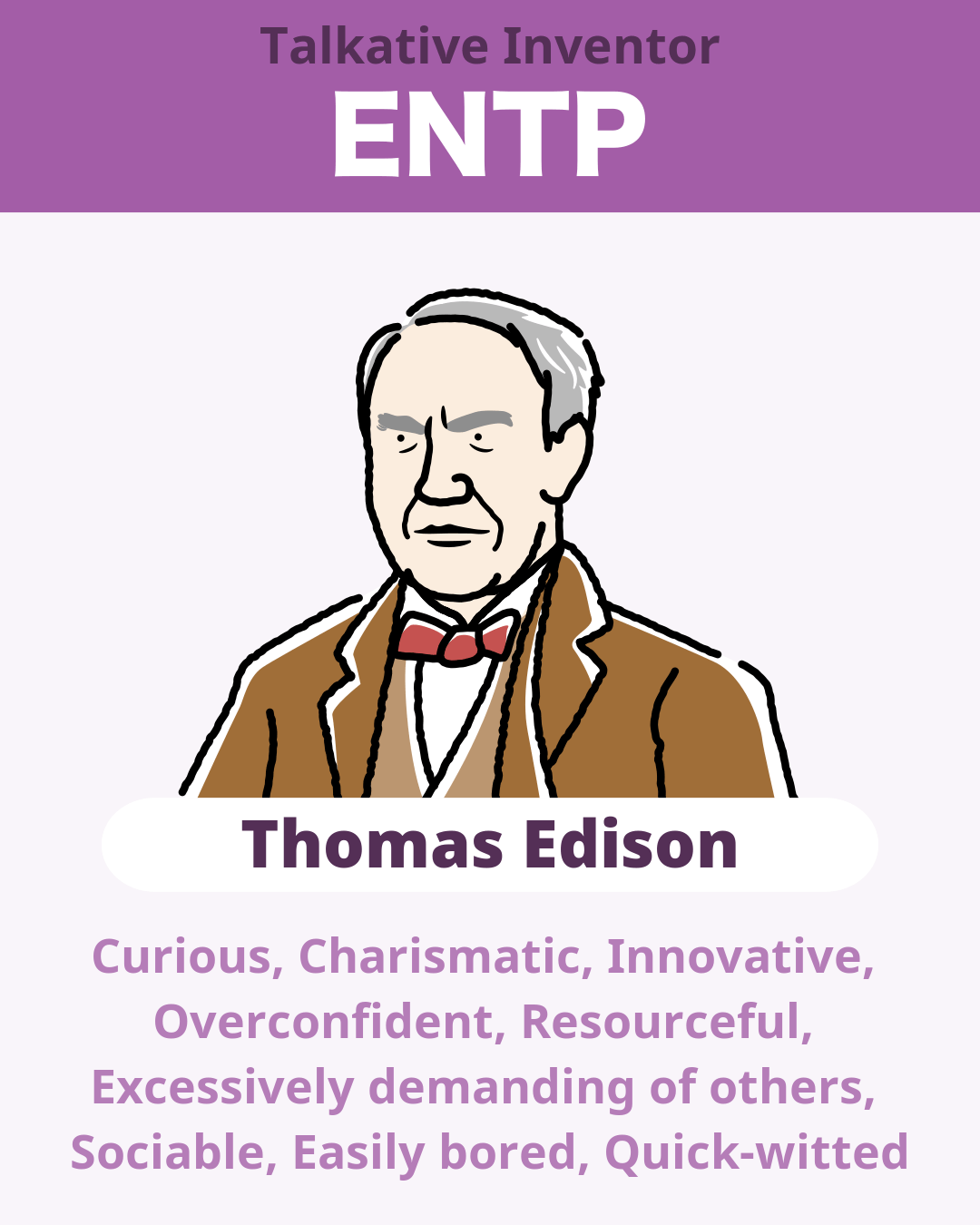
People with the ENTP personality type, also known as the Debater personality type, are quick-witted, talkative, and good at coming up with various ideas. They are often thought of as intelligent by those around them because they enjoy thinking about and understanding how the world works. ENTPs do not think conventionally and have the ability to think things through while communicating and discussing with others. On the other hand, they tend to demand their conversational partners be on the same intellectual level as them, and they are also loners who dislike being restrained by others. ENTPs may seem to be sociable and have a great sense of humor, which leads them to be always surrounded by people, but you may be surprised to find out that this is not always the case. In addition, ENTPs are not good at administrative and routine tasks and have a bad habit of procrastinating when it comes to such tasks, so they need to consciously tackle their problem with task management.





| Ranks | Types | % | |
|---|---|---|---|
| 1 | INFP | Vincent van Gogh | 13% |
| 2 | ENFP | Anne Frank | 11% |
| 3 | ISFP | Mozart | 8% |
| 4 | INTP | Albert Einstein | 8% |
| 5 | INFJ | Nightingale | 8% |
| 6 | ESFJ | Andrew Carnegie | 7% |
| 7 | ISFJ | Mother Teresa | 7% |
| 8 | ESFP | Marie Antoinette | 6% |
| 9 | ENTP | Thomas Edison★ | 6% |
| 10 | ENFJ | Joan of Arc | 5% |
| 11 | ISTJ | Sigmund Freud | 4% |
| 12 | ISTP | Spartacus | 4% |
| 13 | INTJ | Leonardo da Vinci | 4% |
| 14 | ESTJ | George Washington | 3% |
| 15 | ESTP | Columbus | 3% |
| 16 | ENTJ | Napoleon | 3% |
Studying personality types allows us to understand more about ourselves and others. This can help us communicate better, build stronger affinities, and reduce arguments. Also, knowing your personality type can assist you in comprehending your actions and goals better, which can support you in making decisions that will help you be more successful and happy.
The ENTP personality type is smart, has a good sense of strategy, and isn't afraid to question social norms. They have curious minds that can think and dream big, but they don't always get what they want.
In psychology, different personality types have been put into groups since the time of the ancient Greeks. However, it wasn't until the 1950s that these groups were put into different systems and theories. For example, the Myers-Briggs Type Indicator, created in the 1960s based on Carl Jung's work, simplifies the idea that there are 16 personality types.
Today, the MBTI's 16 personality types are also employed in other personality types theories, so the 4-letter MBTI abbreviations are often used in different systems. These traits define the ENTP personality type:
The "E" in ENTP, which stands for "extroversion," shows where you focus and get your energy. Extroverts like to spend time with others and do things outside of themselves. They get energy from being active in the world around them. They get pumped up when they get things going and make things happen. People often figure out how to solve problems best when discussing them with others.
The "N" in ENTP stands for "intuition," which is how you learn and get information. A person with an intuitive personality type looks for patterns and links in words, ideas, and symbols. ENTPs can simultaneously be amusing, funny, challenging, insightful, and warm, a rare talent set that makes them famous. Before they do something, they think about it and develop ideas. They take in impressions and predict outcomes with an eye toward the future rather than the past.
The T in ENTP stands for thinking, which shows how you like to make decisions. A person with a thinking personality type likes to make decisions based on universal principles and values. They look for solutions that can be used by anyone, anywhere. They are careful and logical and try not to let their or other people's feelings affect their decisions.
The P in ENTP stands for perceiving, which is how you like to be seen by others. A person with a perceiving personality likes to live a life that is open, flexible, and easy to change. They like being spontaneous and are less controlled than other people.
They may have brief periods of enthusiasm and interest or have trouble meeting deadlines or making firm decisions. These traits give the ENTP personality type its nickname, The Debater. The Debater is creative and outgoing, has a lot of clever ideas, and is good at making plans.
They like to talk about new ideas, talk about different points of view, and come up with new solutions. Sometimes this comes out as verbal sparring. One thing that makes this type stand out is that they like to argue so much that those who sometimes change sides and play devil's advocate.
Some of the most well-known ENTPs in history, like Socrates and Catherine the Great, were great debaters. This personality type is common among philosophers, writers, and politicians, but many also go into comedy because they are friendly and like to have fun.
Jon Stewart, Bill Maher, Amy Poehler, Steven Colbert, and Joan Rivers are all ENTPs, which doesn't come as a surprise. The ENTP personality type is rare, with only 2-5% of Americans having it. But it also has a more even distribution of women and men than many other personality types, with about as many women as men.
The ENTP is not tied to trades or practices and is motivated by fresh concepts, which creates them very creative and imaginative. They see things differently, combine them in new ways, and aren't nervous about thinking big. Of course, some of their ideas work, but they are more involved in coming up with new ideas and trying them out than in coming up with practical solutions.
They are great at getting quiet people to open up by asking deep and thought-provoking questions and being truly interested in other people's lives and points of view. Even though they love to argue and talk, they are more interested in two-way communication than just telling you what they think.
The ENTP cares a lot about truth and understanding, which is why they are so good at finding new information and points of view. People see debate and discussion as a way to get closer to the truth and better understand it. So, they will quickly give up on their concepts if they are wrong.
The ENTP is brave and has no fear. They are happy to go after big goals and ideas, take risks and fail, say things that aren't popular, and question what has always been done. They dare to implement their ideas and are self-assured to continue after setbacks.
An ENTP has a lot of friends and supporters because they are funny and genuinely interested in things. They can be entertaining, educational, challenging, funny, and warm simultaneously, a rare skill set that makes them very popular.
The ENTP doesn't like to think about how things work in the real world, making them unreliable even if they have good intentions. Because of this, they have trouble staying organized, making plans, not putting things off, and concentrating. They don't want to disappoint people by being unreliable, but their preference for abstract ideas and open-ended plans can make it hard for them to follow through.
ENTPs love to come up with many big, new, creative ideas and follow them wherever they lead. But they are keen on concepts for their own sake, not because they might lead to solutions or other good things. ENTPs don't like to think about practical things, which makes them unreliable even though they mean well. They don't like figuring out how to put their plans and ideas into action, and most aren't good solutions to problems that need to be fixed immediately.
There is a thin line between debate and argument, and the ENTP tends to cross it. Because they don't care about customs or traditions and are so fearless, they may often argue with teachers, bosses, parents, law enforcement, and other authority figures. This can be seen as disrespectful and aggressive.
With these traits, the ENTP must choose work and a career that plays to their strengths and downplays their weaknesses. ENTPs like to keep learning and growing, and they don't like routine or repetitive work. They probably won't do well at jobs requiring constant attention to practical details, particularly if they have tight schedules and deadlines.
When ENTPs have freedom and flexibility, they can be hard workers and useful team members. But they probably won't reach their full potential unless they do something about some of their weaknesses.
An ENTP needs to work on being reliable and following through to be successful at work and happy in life and relationships. No one wants to work with or live with someone who always forgets deadlines or commitments, and the ENTP won't be able to reach their own goals if they don't become more persistent.
The most important thing for an ENTP is that they love solving problems, especially ones no one else has solved. They are sure they can develop new ways to solve unique and hard problems. ENTPs don't focus on traditional ways to solve problems or make plans. Instead, they trust themselves to change as they go.
They often look for new ways to do things that will help them improve on what they've already done and find solutions that work. Their ability to use this approach to deal with problems, whether technical, social, or philosophical, can help them do well at work in many fields.
ENTPs like to work in a place that pushes them intellectually but isn't too structured or limiting. They like working with a flexible, easy-going team that values creativity and new ideas over old ways of doing things. This lets them work together while doing certain tasks in their way. Most of the time, ENTPs like to think about the big picture of a project or task, while others take care of urgent or practical tasks.
When interacting with other people at work, ENTPs are friendly and open-minded. ENTPs usually have these traits in their communication and leadership styles:
The Debaters are very interesting, and their quick wit and creative ideas make it easy for them to get fans, friends, and supporters. They want to get to the bottom of a problem and look at its parts and effects, even if that implies switching sides in the middle of the discussion. This lets them find unique solutions and come up with truly new ideas.